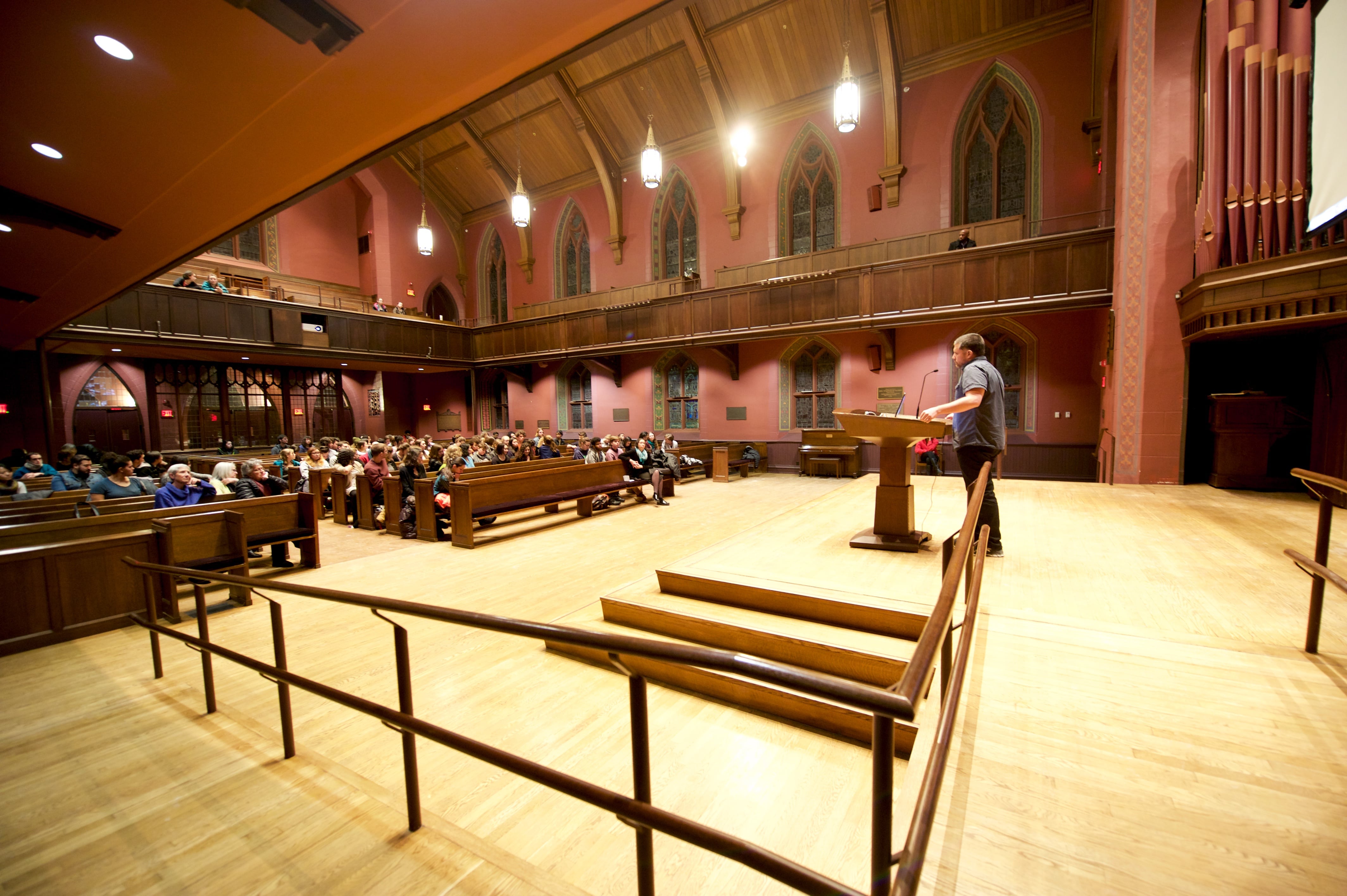
On Tuesday, Feb. 9, Guillermo Calderón visited the University as part of the Outside the Box Theater Series. Calderón spoke in the Memorial Chapel to students and public alike about his new play and his creative process.
A Chilean-born playwright and director who specializes in political theater, Calderón expressed that he intends for his politically centered plays to start conversations about society and to have the public finish the conversation. He feels that the genre of documentary is more striking than any possible form in which he could ever write and believes that truth and facts are more powerful than works of fiction.
Calderón explained his creative process to the audience, expressing that he relies heavily on the research to the point of overloading himself with knowledge on the subject. Then, he proceeded to decide on a dramatic situation to frame his piece. Calderón’s actual writing process involves countless drafts as well as the contribution of his actors to flesh out his ideas and expand the possibilities for his artwork.
“I’m interested in their minds and intellect,” Calderón cited as the reason for his actors’ prominent role in the process.
Alongside explaining his creative process, Calderón explained the entangling ethical lines that fuel his upcoming play, which is set to be finished in early October and serves as a response and continuation of his current touring play, “Escuela.” In “Escuela,” he manages to highlight the erased history of a subculture and uprising against the government during 1980s Chile. The play explores the complicated relationship of violence as he tells the story of the “secret schools” that were established for young people to learn about political theory and ways to handle the regime with violent means.
“The subject matter was unavoidable,” he recounted, referencing the violence and strife that occurred during this subset of history. Calderón felt the need to tell the truth of the individuals who were part of this erased history.
In a video clip of the play that Calderón screened, the actors are masked with t-shirts in the form of ski masks to keep members of these groups anonymous to each other. This brand of secrecy still holds today when these schools are observed in Chile. The denial of facial expression onstage warrants the full attention of the viewer to rely on the voice of the actors to perceive emotion.
Calderón’s research for “Escuela” involved meeting members of these schools to incorporate their stories and experiences into the play. Among the people that Calderón and his actors met was a man named Jorge Mateluna, who currently resides in a Chilean prison and is believed to be wrongfully detained for a bank robbery from a few years ago. The evidence that supports this claim consists of a security video from his holdings; during a line up, the eyewitness does not choose Mateluna, although the police paperwork indicates otherwise. The blatant disregard of due process and justice has disgusted Calderón because Mateluna sits in a prison for a crime that he did not commit and the damning proof was dismissed from the court proceedings.
After this, the video was uploaded to YouTube, and has accumulated fewer than 100 views even though it serves as evidence to a great scandal in Chile. Before his recent incarceration, Mateluna was found guilty of a previous bank robbery that resulted to the death of a police officer. Calderón believes that the police serve to punish Mateluna for his past actions and fabricated evidence to do such.
Sadly, Calderón has developed a strong distaste for his country through his research for “Escuela” and the Jorge Mateluna case. He refers himself as anti-nationalistic and refers to the country as a failed project. In his opinion, the dissolution of his native country would benefit its people more than remaining intact. Using his animosity and ability to start conversations with his art, Calderón strives to explore the ethics and morality of Mateluna’s experience.
Despite the fact that they are attempting to defend him, Calderón and his actors possess a healthy distrust of Mateluna because they do not have the whole truth. Instead, they only have sides of stories that do not culminate into a coherent explanation of the situation.
Calderón’s vision for this upcoming play involves the weaving and construction of falsehoods that pose as truth. His hope is for the YouTube video to conclude the play and thereby emphasize the truths and lies within the government system, relationships, and society.
“We’re going to present the dirt and let people elaborate,” Calderón explains.
Calderón’s talk addressed controversial topics and expressed acute hostility. He strove to explain to the audience that he reveres his profession and the art he makes. In concluding the talk, Calderón stressed his passion for both his country and his profession.


Leave a Reply